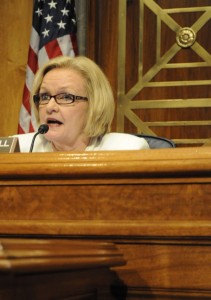WASHINGTON — Finding the party responsible for oversight of contractors in Afghanistan is “like I’m boxing ghosts” Sen. Claire McCaskill, D-Mo., said Thursday.

Sen. McCaskill, D-Mo., chairs the ad hoc subcommittee looking into the oversight of contractors in Afghanistan.
“The sad thing about this hearing is that I’d been hopeful back in 2007 that by this year we would have done a lot to overcome some of the problems in reconstruction contracts,” said McCaskill, who chairs the ad hoc Senate subcommittee looking into allegations of bribery, mishandling of funds, and the lack of accountability throughout the contractor system.
“This hearing does not make me feel good about the progress we’ve made,” she said. “There has been some progress, but the American people cannot afford this anymore.”
The changing role of Commander’s Emergency Response Program funds in Afghanistan drew criticism.
“CERP money is not reconstruction money. … It is not meant to be in place of long-term reconstruction funding,” said David Sedney, the deputy assistant secretary of Defense for Afghanistan, Pakistan and Central Asia. The Defense Department had 90,800 contractors in the country as of June 21.
McCaskill said however, that the money is being used to finance large construction projects, not the small-scale projects that were “the original use in Iraq.”
“There is a disconnect between what the commanders in the field want to have happen and what actually happens,” McCaskill said.
That disconnect is where the committee believes the country can save money on reconstruction.
The committee asked Defense officials for data showing that CERP money helped directly with the military mission. GAO had previously recommended a similar study.
McCaskill pointed to the Gardez-Khost Highway project as one that illustrates lessons she said should have been learned in Iraq.
The Louis Berger group, a large contractor with 167 subcontractors in Afghanistan, is responsible for the project, which The New York Times reported in May is paying up to a $1 million a year to an Afghan linked to insurgents. The project is expected to be more than $100 million over budget.
Larry Walker, the company’s president, said the excess cost is mainly due to security concerns.
Walker had no answer to McCaskill’s question about why security operations were not changed with a changing security situation.
The senators also asked for a report of significant milestones reached by counternarcotic contractors.
No one testifying could immediately provide the committee with answers to their requests for data, milestones or concrete financial records.
“I’m trying to figure out who’s in charge. I’m trying to figure out how much money we’re spending and who’s in charge,” McCaskill said. “It’s ironically difficult.”
The hearing was the subcommittee’s fifth on contractor accountability.
